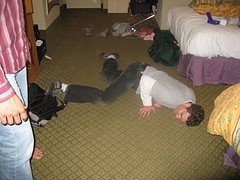Wow, what an experience. I thought I knew a lot, and I suppose I do compared to some, but I got a lot out of having to evaluate and test these things in an organized way. Most of what I saw was interesting, cool, and entertaining. Yet there's a lot that I'm not so sure about.
When you put together the masses and ask them to rate things, you'll get opinions in the middle of the bell curve. I haven't yet seen a social networking site that shows both the mean rating and the standard deviation (a measure of how widely dispersed the opinions are) of something. There's a lot of mediocrity in those ratings.
I'm also not a social animal; I don't get much enjoyment out of just linking with people. I already have a few close friends and am happy with those few. I'm not in the dating scene, so there's no attraction there. Also, when I want to know about something, I use the tools available to me (Google, especially) and find it on my own, often more efficiently than I can find it through a site that aggregates blogs, websites, tags, podcasts, or whatever. I also have no trouble keeping up with the few websites and feeds that interest me. I don't need a ton of stuff delivered automatically to my computer every day; that's just not the way I do things. I flit from one thing to another, only a very few of which have anything to do with a computer. It's like having too many magazine subscriptions and feeling pressured to read all of that stuff.
I also don't know how much networking really goes on. The sponsors of these sites are really, though they don't say it, interested in how often you visit and how long you stay, so they can charge more for advertising. If you come to a site repeatedly to add widgets, write blogs, upload photos, change templates, customize a blog, etc., that's as good to the site as it would be if you did none of that and actually communicated with other people. And I recognize that there are many people who do enjoy lots of socializing, connecting, networking, meeting people, etc. I have no problem with that; this is just my own personal slant.
On the positive side, the technology itself is just mind-blowing at times, and I do look at a few feeds and read the NY Times online, and download the occasional podcast for listening. I had a palace-ful of fun doing these tasks and exploring these tools and places. Some of the tools are a little useful, and perhaps I'll use a couple here and there--the experience was far from being a waste of my time. In fact, I'm very grateful to those who got us involved, did all the background work, set up the tech fair, invested the organization's time and resources, all to help us be better at our jobs and in our lives.
Tuesday, June 12, 2007
Subscribe to:
Post Comments (Atom)








3 comments:
Bravo. Great that you are done! I hope we get to put some of this to use in our branch..
Hi Alan!
I have not finished the things yet and have not really considered very long about what I think of this whole phenomenon yet. I should probably wait to comment until I have been able to do some mature reflecting; but that has never been my style before, so here goes!
I agree with very nearly everything you say. My preferred lifestyle seems to be similar to yours: I have real friends with whom I interact in person, I find my information from diverse sources, which suit me.
I have worked in libraries and information science for a long time, and as long ago as 1972 in library school I learned about the information revolution and the dilemma of too much information - and that was before the age of PCs! Again, in 1988 I did a secretarial course and the instructors talked about information overload. My personal style in decision-making is to find out quite a bit about a problem, but not absolutely everything, just enough to take reasonably informed and sensible action. I'm an action person and reasonably confident to act. Not everybody is.
I only know about the US and the western world, but I think the current need for everyone to be in touch constantly with news and options is born out of huge societal fear and anxiety. To me, this is fuelled by commerce, business, the media (which is now purely a business), and advertising. All these forces keep people constantly on the hop thinking they are missing something, that they are in some way marginalized or in danger of being marginalized.
I believe that things like RSS feeds and streaming news media, the ability to automatically save and view later the popular TV shows, the automatic reminder to consumers of new products like what they already bought, the ability to know exactly what your friends are doing at any time are so popular because they help to alleviate that pervasive fear of being left out and left behind.
Perhaps as society gets used to new and constantly changing technology people will develop more comfort with choosing what suits them. I see a trend where there are multiple options and no option is the "correct" one any more.
Thus it behooves us to keep current about technological developments, but not necessarily to embrace each one for ourselves.
That reminds me of our speaker at staff day who reminded us of the dangers of having too many choices. I forget his name and can't look it up because I want to finish this comment and go for a walk! I have his book and agree with much of what he says. He seems to me to be maintaining that various "authorities" should limit our choices for our own good. I have a problem with this - who are these authorities going to be?
This thought leads me to Web 2.0 technologies as instruments of social change. They have the potential to change the way people think about everything in life and society. At the moment, they are often subverted to serve commercialism and mediocrity, but they could be huge forces to bring people together to change how things are. Does anyone have a comment on that?
Barry Schwartz did a talk on too many choices at MLA last year or the year before, and he was quite compelling. It's interesting to think that, perhaps, the more we plug into blogs and social networking sites and gaming sites--that is, the more we supposedly connect with the larger world around us--the less we seem to really know about what's really going on in the world (the corporatization of America, the co-opting of our votes through emotional arguments and call-in talk shows, the viewpoints of disparate cultures, etc.).
Post a Comment